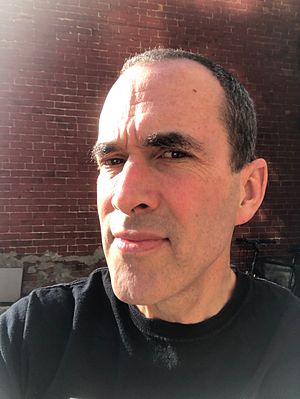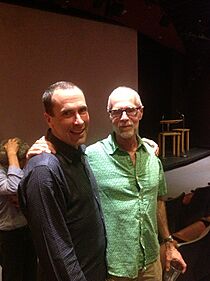John Greyson facts for kids
Quick facts for kids
John Greyson
|
|
|---|---|

Greyson in 2014
|
|
| Born |
John Greyson
March 13, 1960 Nelson, British Columbia, Canada
|
| Nationality | Canadian |
| Occupation | Film director, film producer, screenwriter, video artist |
| Years active | 1984–present |
| Partner(s) | Stephen Andrews |
John Greyson (born March 13, 1960) is a Canadian director, writer, and artist. He is also a political activist, meaning he works to bring about social change. His movies and videos often explore themes of social justice and the lives of LGBTQ+ people.
Greyson was part of a group of filmmakers in the 1980s called the Toronto New Wave. His most famous films include Zero Patience (1993) and Lilies (1996). His work and his activism have made him a well-known figure in Canada and around the world.
Besides making films, Greyson is a professor at York University's film school. He teaches students about film history, how to make movies, and how to edit them.
Contents
Early Life and Career
John Greyson was born in Nelson, British Columbia. He grew up in London, Ontario, and moved to Toronto in 1978. There, he started his career as a writer for magazines and as an artist who made videos.
He directed several short films before making his first feature film, Pissoir, in 1988. The film was a response to the unfair treatment of gay men by police during that time.
In 1991, Greyson made a short musical film called The Making of Monsters. It tells a fictional story about the making of a TV movie. The TV movie is about a real-life event where a teacher was killed. Greyson's film questioned why the teenagers involved were shown as evil monsters instead of normal kids who made a terrible choice.
Greyson is best known for his feature films Zero Patience and Lilies. He has also directed episodes for TV shows like Queer as Folk and Made in Canada.
Exploring Important Topics Through Film
The Story of 'Fig Trees'
In 2003, Greyson created Fig Trees, a video opera about the South African AIDS activist Zackie Achmat. AIDS is a serious illness caused by the HIV virus. At the time, life-saving medicine was not available to everyone in South Africa. Achmat protested by refusing to take his own medicine until everyone could get it.
Greyson's project told Achmat's story to raise awareness. In 2009, he released a full-length movie version of Fig Trees. The film won an award at the Berlin International Film Festival.
The Musical 'Zero Patience'
Zero Patience is a 1993 musical film that challenges ideas about the history of the AIDS epidemic. At the time, many people wrongly blamed one person, a Canadian flight attendant, for bringing HIV to North America. This idea came from a popular book.
Greyson's film tells a different story. In the movie, the ghost of the flight attendant, called "Patient Zero," meets the famous explorer Sir Richard Francis Burton. Together, they explore the history of the disease and show how blaming one person was wrong. The film uses songs and humor to talk about a serious subject. It argues that focusing on blame was harmful and that the real focus should have been on science and helping people.
The Award-Winning 'Lilies'
In 1996, Greyson directed Lilies, which became his most famous film. It is based on a play by Michel Marc Bouchard. The film was a huge success, winning four Genie Awards, including Best Picture.
The story is set in two different time periods, 1912 and 1952. In 1952, a bishop visits a prison to hear a confession from a man named Simon. But the prisoners lock the bishop in and perform a play for him. The play tells the true story of what happened between the bishop and Simon when they were young schoolboys in 1912, and how it led to the death of their friend, Vallier.
A unique part of the film is that all the characters, including the women, are played by male actors. This is because the story is being acted out by the male prisoners. The film is known for its beautiful visuals and powerful storytelling about love and memory.
Later Work and Personal Life
Greyson has continued to create interesting projects. In 2013, he released Murder in Passing, a mystery series shown in 30-second clips on video screens in Toronto's subway system.
In 2021, his short film International Dawn Chorus Day won an award at the Berlin International Film Festival.
Greyson's partner is the Canadian artist Stephen Andrews. They have been together since the 1990s and are considered an important couple in Canada's art world.
Awards
- The University of Toronto's Citizenship Award, for helping to educate people on issues of sexual diversity.
Filmography


